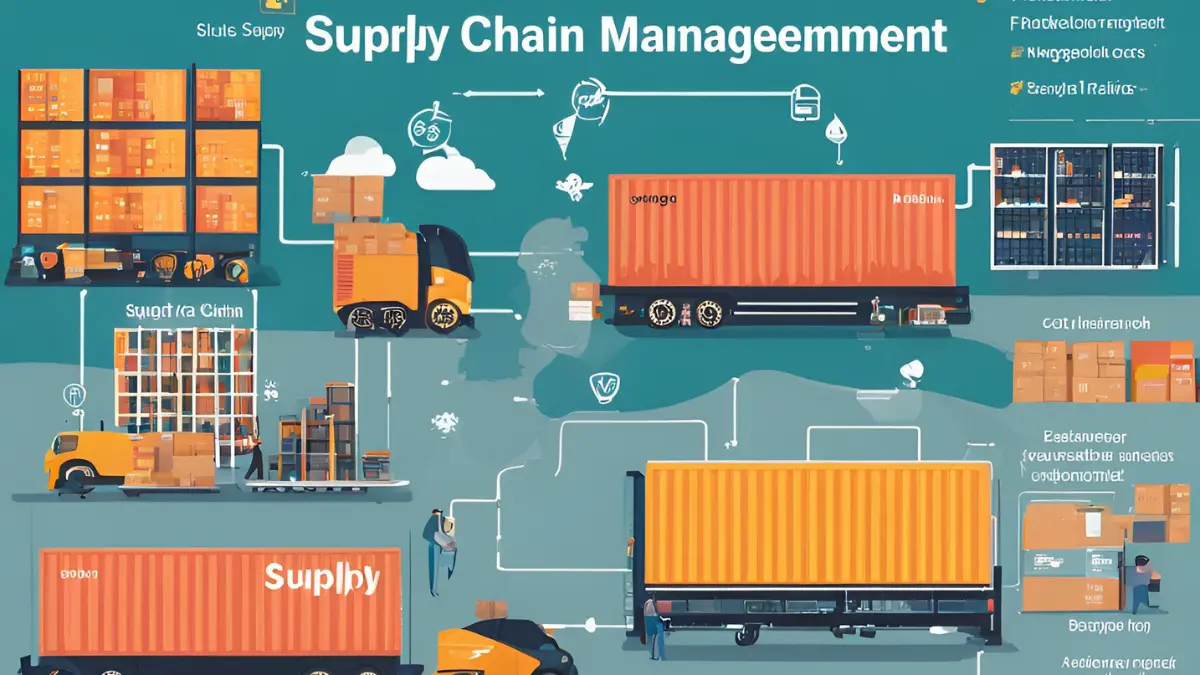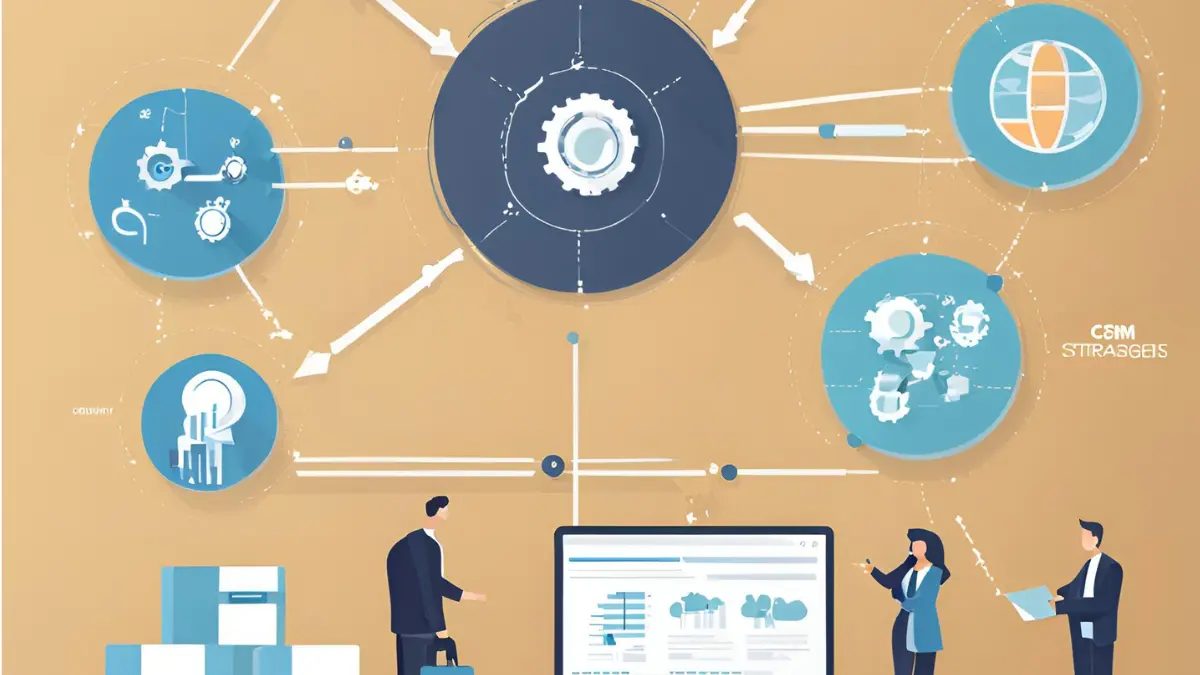Are supply chain disruptions causing you sleepless nights? Issues like delays and inefficiencies can lead to higher costs and missed opportunities, making supply chain management essential for overcoming these challenges.
Supply chain management (SCM) is the backbone of every efficient business, ensuring smooth transitions from raw materials to consumer delivery. It adapts to market demands, technological changes, and fluctuating consumer expectations to maintain seamless operations.
This article will explain supply chain management and its workings and crucial role in streamlining business processes. Let’s explore how effective SCM can transform your operations.
Consider HashMicro SCM System to enhance your supply chain with real-time tracking, improved coordination, and automated processes. Its user-friendly interface and customizable features help you tackle inefficiencies and stay ahead in a competitive market.
Table of Content:
Table of Content
Key Takeaways
|
What is Supply Chain Management (SCM)?
Supply chain management (SCM) refers to coordinating and overseeing all steps involved in producing and distributing goods—from sourcing raw materials to delivering the final product to consumers.
SCM integrates processes and strategies to streamline workflows and meet customer demands, particularly in the supply chain industry.
The essence of supply chain management is optimizing the supply chain process, ensuring that goods and services flow seamlessly between suppliers, manufacturers, warehouses, and distribution points. This interconnected system impacts multiple aspects of a company, from logistics and production to planning and delivery.
Many companies rely on logistics and supply chain management software to eliminate manual errors, predict demand accurately, and make data-driven decisions. With sustainable supply chain management practices gaining importance, companies also focus on eco-friendly practices to reduce waste and carbon footprints.
Why is Supply Chain Management Important?
Large business scale increases and complicates production and distribution activities. Companies need SCM to efficiently and effectively coordinate their supply and demand.
Raw materials and other inventory goods also play a big role in how a company serves its customers. Thus, supply chain management performance must be good so that problems arising from supply chain complexity do not occur.
Problems with the supply chain is one of the company’s worst nightmares, so improving SCM performance means cutting production costs, which will help the company increase its profits.
Example of Supply Chain Management
To help you as a business actor implement a supply management system in the company, the following are two examples of SCM.
SCM in a service company
Certain medical treatments, inpatient facilities, medicines, and hospital kitchen ingredients are the products of a company that provides healthcare services, such as hospitals.
This planning component can involve the company’s decisions regarding providing these services. Supply chain management will be useful for various hospital services.
This includes direct service provision at the hospital site using online methods, sources, and inventory. It also involves searching for credible drug suppliers and providing ambulances as a transportation component.
SCM in goods company
SCM plays a significant role in a goods company because it is closely related to providing goods. An example is a food raw material company.
The supply chain management team must be able to plan how to handle the raw material models, variants, packaging, and distribution locations for these food raw materials.
How Supply Chain Management Works
Understanding how SCM works is key to implementing it effectively. SCM encompasses planning, sourcing, production, logistics, delivery, and returns.
Below is a breakdown of how each step in the supply chain process functions:
1. Planning and strategy
The initial stage involves strategic planning to forecast inventory needs, monitor market demands, and allocate resources.
A well-crafted SCM system relies on advanced planning tools and supply chain management software to manage resources optimally.
2. Sourcing
This step identifies and evaluates suppliers for quality, cost-efficiency, and delivery timelines. Effective vendor selection ensures that raw materials and supplies are procured without disruption.
Advanced SCM systems include vendor analysis tools for streamlined operations.
3. Production
Manufacturing is at the heart of the supply chain process. Delays or inefficiencies during this phase can lead to production bottlenecks and higher costs.
Utilizing supply chain management software enables automated monitoring and scheduling, ensuring the production process is as efficient as possible.
4. Delivery and logistics
Logistics and transportation are critical for ensuring that goods are delivered to the correct location at the right time. Delivery delays can harm a company’s reputation.
Implementing logistics and SCM tools like Multi-Stop Route Planner apps improves delivery speed, route optimization, and customer satisfaction.
5. Returns management
Returns handling is an often overlooked yet vital component of the supply chain process. Effective returns management ensures customer satisfaction and builds loyalty by solving customer complaints promptly.
By managing these interconnected stages, companies streamline costs, reduce risks, and ensure that consumer demand is consistently met with the help of SCM systems.
You also need to know about AI demand forecasting and how it enhances supply chain management (SCM) by improving accuracy, automating inventory, and optimizing strategic planning.
Supply Chain Principles for Business Success
The backbone of every successful supply chain management system is founded on proven principles. Implementing these principles ensures that the supply chain process runs smoothly and effectively across industries:
- Customize the logistics network to align with consumer preferences.
- Categorize customers’ unique needs to forecast demand better.
- Leverage market trends for accurate demand predictions and strategic resource planning.
- Manage suppliers strategically to minimize costs while maintaining quality.
- Implement technologies for decision-making, allowing better insights and system-wide visibility.
- Focus on performance metrics to track supply chain efficiency and optimize processes.
Types of SCM Strategies
Companies can use several SCM strategies to optimize their operations and meet customer demands. The six types are:
1. Agile Supply Chain Management
Flexibility and speed are at the core of this strategy, with companies building supply chains that can swiftly adjust to shifting market demands.
This approach allows quick responses to changes in customer preferences, market trends, or unforeseen disruptions, enabling businesses to remain competitive without sacrificing responsiveness or customer experience.
2. Lean Supply Chain Management
This strategy aims to eliminate waste and cut costs by optimizing production processes and carefully managing inventory levels.
Lean SCM focuses on improving operational efficiency by eliminating non-value-added activities, streamlining processes, and ensuring resources are used effectively—all while maintaining quality standards.
3. Efficient Supply Chain Management
The focus here is on reducing operational costs while maintaining smooth and uninterrupted movement of goods and services.
Companies adopting this strategy prioritize minimizing inventory, cutting transportation expenses, and enhancing production processes. The goal is to drive profitability by achieving operational efficiency without unnecessary delays.
4. Responsive Supply Chain Management
Speed and adaptability define this strategy, as companies strive to maintain supply chains that can react quickly to changes in customer needs or market trends.
This often involves adjusting production schedules, fine-tuning logistics, or making other strategic shifts to ensure timely responses and maintain customer satisfaction.
5. Green Supply Chain Management
Centered on sustainability, this strategy incorporates environmentally responsible practices throughout the supply chain.
Key components are reducing carbon emissions, minimizing waste, integrating renewable energy, and implementing sustainable processes.
Beyond cost savings, this approach demonstrates corporate responsibility by supporting environmental goals while meeting customer expectations for sustainability.
6. Service Supply Chain Management
Prioritizing exceptional customer service is the foundation of this strategy. It involves creating a supply chain capable of quickly addressing customer needs and resolving concerns efficiently.
A responsive service supply chain builds trust and long-term customer loyalty by focusing on seamless interactions and consistently meeting expectations.
Each strategy has advantages and disadvantages, and companies may combine approaches to optimize their supply chain operations.
Benefits of Supply Chain Management
Implementing a strategic supply chain management system brings numerous advantages to businesses:
- Reduced Operational Costs: Optimized supply chain processes cut waste, streamline inventory, and lower production costs.
- Faster, Smarter Decision Making: Real-time SCM software insights allow businesses to pivot quickly in response to market changes.
- Enhanced Customer Satisfaction: Accurate demand forecasting and delivery improvements improve service and customer loyalty.
- Improved Data Visibility: Monitor market trends, logistics, and inventory in real-time to make informed, data-driven decisions.
Simplify Complexity with HashMicro’s All-in-One SCM Platform
HashMicro’s SCM system seamlessly manages your supply chain by integrating inventory, procurement, and logistics into one intuitive platform. It eliminates manual tasks and increases operational efficiency with real-time insights.
With automation and accurate data tracking, businesses can optimize resources, reduce costs, and prevent errors. HashMicro’s system empowers more intelligent decision-making, ensuring your supply chain runs smoothly and competitively.
Features:
- Inventory Management: Monitor stock levels in the warehouse while making inventory adjustments with minimal risk.
- Procurement Management: Schedule notifications when stock runs low and automatically send purchase orders to your vendors.
- Order Management: The SCM software simplifies tracking and fulfilling customer orders.
- Shipment Tracking: Track courier locations to ensure all customer orders are timely.
- Return Management: Efficiently manage customer returns with real-time stock updates.
- Planning & Forecasting Management: Predict future stock needs by analyzing existing data to maintain optimal inventory levels.
Conclusion
Efficient supply chain management is vital for controlling costs, meeting demand, and ensuring seamless production and delivery. By strategically using SCM software, businesses can cut costs, streamline logistics, and build stronger relationships with their customer base.
Hashmicro offers innovative solutions with SCM systems that ensure end-to-end visibility, improved logistics, and operational efficiency. Stop manually struggling with bottlenecks and inefficiencies.
Ready to experience streamlined operations? Schedule a free demo today with Hashmicro and transform your business’s supply chain management!









































